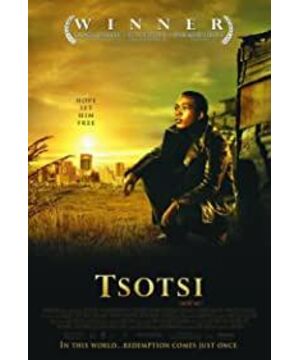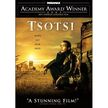This is the best foreign language film, the storyline is about a gangster who accidentally robbed a child, so his life changed, and to put it bluntly, he changed his ways. Listening to the meaning, this is indeed turning bad people into good people, and the process of saving children also saves their own souls. If it wasn't a South African film, it would have won the Oscars. To be honest, I was really skeptical, because after watching the film, my first feeling was that the ending wasn't strong enough.
So let's start from the end.
Against the black background, Tsotsi in white raised his hands. The director was very contrived. The moment Tsotsi was about to send the child back, the white shirt appeared, so I don't need to say more about what it means, and I don't need to say more about what the raised hands mean.
But I still don't quite get it, does this show Tsotsi's redemption? Very doubtful.
Let me give an example of the reason why Tsotsi was able to return the child.
First, the child reminded him of his own childhood.
When I was a child, the cement pipe was a memory when I ran away from home. Later, I learned that the homeless would also find the cement pipe, which could keep out the wind and rain. In comparison, this child is too happy to be born in a rich family, which makes Tsotsi very envious, but if he continues to raise this child, then the future of this child may also live in concrete pipes, which is a very realistic problem . There is a hint of kindness in the nature of the bad guy, he can't let his child live like this, he can't be a thug like himself, and live without dignity. This is where our protagonist is extremely valuable, that is, although he is a thug, the kindness in his nature has not been extinguished. So he decided to send the child back.
But one thing, what if the thug's mentality is extremely unhealthy? For example, when I see a child born in a wealthy family, I feel unfair, so I don’t let the child go home. This kind of thinking is also possible. So the premise that Tsotsi can send the child home is that there is still kindness in his heart.
The second point is about maternal love.
The child needs milk, which is a problem that the thugs cannot solve, so the thugs find a nurse for the child.
The plump breasts are very attractive when the nurse opens up her clothes, which is a warm maternal care that Tsotsi lacked when he was a teenager.
The child's mother had a leg amputated by Tsotsi and lost the child. This means that Tsotsi has killed a mother's love, and it also means that the child has lost its mother's love. Coincidentally, our protagonist has also lost his mother's love. In the environment of South Africa, it doesn't matter what the disease is, but there are probably many people who have lost their mother's love. Especially at the same time when the mother's love was missing, Tsotsi's dog was also beaten by his father, and from that moment, the love was no more.
But the wet nurse showed Tsotsi his long-lost maternal love, which was too important to stimulate him for someone who grew up without it. So, when he thought of his mother's helpless hand reaching out to him on the hospital bed, he also thought of the mother who was injured by him.
A son needs a mother's love, which a bottle or even a nurse can't replace.
The third point is about violence.
On the tram, Tsotsi's knife mercilessly stabbed the fat old man's chest, making Boston, who is known as the little teacher, extremely unhappy.
So, the little teacher was beaten.
Is violence the only solution to the problem? Although the film is about thugs, there is no explanation for this, except that after beating up the little teacher, Tsotsi seems so lonely. When he was a teenager, his alcoholic father also made him so lonely. Violence is sometimes a surge of loneliness. spring.
When Tsotsi kills his accomplices to protect the rich, Faxiao finally leaves him. While this violence has its righteous side, in fact, he has become more alone.
The child at this time is his only hope, and of course there may be the nurse incarnated as a mother, but in fact, these two people are acquainted with violence, and it is impossible to formally forgive his violence.
Tsotsi's sending the child back was not so much an atonement for violence as it was a fear of loneliness.
The fourth point is about dignity.
Everyone has dignity, even the disabled old man at that station. What is dignity, decency, and beauty?
No, dignity is to respect oneself, this is the answer of the little teacher who was beaten by Tsotsi.
Another aspect of dignity in the film is the dialogue between Tsotsi and the disabled old man.
What is dignity? I like to feel the sunshine on the street. Even if I only have two hands, I can still feel the warmth. This is also living, and has nothing to do with poverty.
There is a dog with a broken back bone and crawling on the ground, is that its own incarnation? Tsotsi became a thug for fear of being like a dog. But in fact, he couldn't see the sun and couldn't really live.
The wind chimes are ringing, representing happiness and sadness. There are also colors in the broken glass, beautiful colors. Even if your husband dies, you still have to live happily and tastefully.
The nurse didn't say much, and there was no direct dialogue about dignity, but that hut made Tsotsi truly feel the value of dignity. Life is all about dignity.
Tsotsi sent the child back for dignity, and only those who live in the sun can enjoy dignity.
Tsotsi is not hopelessly bad, all his actions are indeed a kind of redemption, but it is not the redemption of the present him, but a past, the boy who lacked maternal love and lived under the shadow of violence.
Perhaps Tsotsi was full of gratitude when he brought the child back to his parents' arms, thanking the child for making him a teenager, and thanking the child for making him regain his dignity.
But as a thug, does this redemption really mean so much?
Does rescuing the teenage Tsotsi mean that the adult Tsotsi can live as a good person? Can dignity really be satisfied in the joy of poverty?
Although the four reasons were all there, and also contributed to Tsotsi's motivation to send the child back, this was only Tsotsi in his youth, and for him as an adult, these reasons were naive. Because of this, when Tsotsi, who was wearing white, raised his hands to the police, I was lost as a viewer.
Is it the fading of Tsotsi's tears or the reality in my eyes? I can't tell.
Perhaps, instead of surrendering to the police, Tsotsi surrendered to his unforgettable childhood, which is extremely sad!
2006-9-14 in Tongzhou
Han Xi
View more about Tsotsi reviews









